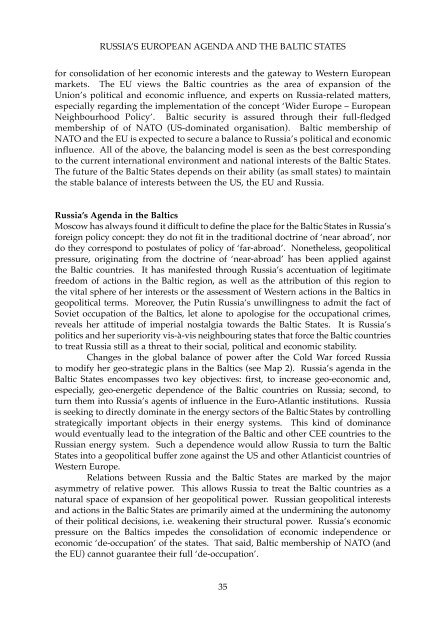Russia's European Agenda and The Baltic States - Defence ...
Russia's European Agenda and The Baltic States - Defence ...
Russia's European Agenda and The Baltic States - Defence ...
You also want an ePaper? Increase the reach of your titles
YUMPU automatically turns print PDFs into web optimized ePapers that Google loves.
RUSSIA’S EUROPEAN AGENDA AND THE BALTIC STATES<br />
for consolidation of her economic interests <strong>and</strong> the gateway to Western <strong>European</strong><br />
markets. <strong>The</strong> EU views the <strong>Baltic</strong> countries as the area of expansion of the<br />
Union’s political <strong>and</strong> economic influence, <strong>and</strong> experts on Russia-related matters,<br />
especially regarding the implementation of the concept ‘Wider Europe – <strong>European</strong><br />
Neighbourhood Policy’. <strong>Baltic</strong> security is assured through their full-fledged<br />
membership of of NATO (US-dominated organisation). <strong>Baltic</strong> membership of<br />
NATO <strong>and</strong> the EU is expected to secure a balance to Russia’s political <strong>and</strong> economic<br />
influence. All of the above, the balancing model is seen as the best corresponding<br />
to the current international environment <strong>and</strong> national interests of the <strong>Baltic</strong> <strong>States</strong>.<br />
<strong>The</strong> future of the <strong>Baltic</strong> <strong>States</strong> depends on their ability (as small states) to maintain<br />
the stable balance of interests between the US, the EU <strong>and</strong> Russia.<br />
Russia’s <strong>Agenda</strong> in the <strong>Baltic</strong>s<br />
Moscow has always found it difficult to define the place for the <strong>Baltic</strong> <strong>States</strong> in Russia’s<br />
foreign policy concept: they do not fit in the traditional doctrine of ‘near abroad’, nor<br />
do they correspond to postulates of policy of ‘far-abroad’. Nonetheless, geopolitical<br />
pressure, originating from the doctrine of ‘near-abroad’ has been applied against<br />
the <strong>Baltic</strong> countries. It has manifested through Russia’s accentuation of legitimate<br />
freedom of actions in the <strong>Baltic</strong> region, as well as the attribution of this region to<br />
the vital sphere of her interests or the assessment of Western actions in the <strong>Baltic</strong>s in<br />
geopolitical terms. Moreover, the Putin Russia’s unwillingness to admit the fact of<br />
Soviet occupation of the <strong>Baltic</strong>s, let alone to apologise for the occupational crimes,<br />
reveals her attitude of imperial nostalgia towards the <strong>Baltic</strong> <strong>States</strong>. It is Russia’s<br />
politics <strong>and</strong> her superiority vis-à-vis neighbouring states that force the <strong>Baltic</strong> countries<br />
to treat Russia still as a threat to their social, political <strong>and</strong> economic stability.<br />
Changes in the global balance of power after the Cold War forced Russia<br />
to modify her geo-strategic plans in the <strong>Baltic</strong>s (see Map 2). Russia’s agenda in the<br />
<strong>Baltic</strong> <strong>States</strong> encompasses two key objectives: first, to increase geo-economic <strong>and</strong>,<br />
especially, geo-energetic dependence of the <strong>Baltic</strong> countries on Russia; second, to<br />
turn them into Russia’s agents of influence in the Euro-Atlantic institutions. Russia<br />
is seeking to directly dominate in the energy sectors of the <strong>Baltic</strong> <strong>States</strong> by controlling<br />
strategically important objects in their energy systems. This kind of dominance<br />
would eventually lead to the integration of the <strong>Baltic</strong> <strong>and</strong> other CEE countries to the<br />
Russian energy system. Such a dependence would allow Russia to turn the <strong>Baltic</strong><br />
<strong>States</strong> into a geopolitical buffer zone against the US <strong>and</strong> other Atlanticist countries of<br />
Western Europe.<br />
Relations between Russia <strong>and</strong> the <strong>Baltic</strong> <strong>States</strong> are marked by the major<br />
asymmetry of relative power. This allows Russia to treat the <strong>Baltic</strong> countries as a<br />
natural space of expansion of her geopolitical power. Russian geopolitical interests<br />
<strong>and</strong> actions in the <strong>Baltic</strong> <strong>States</strong> are primarily aimed at the undermining the autonomy<br />
of their political decisions, i.e. weakening their structural power. Russia’s economic<br />
pressure on the <strong>Baltic</strong>s impedes the consolidation of economic independence or<br />
economic ‘de-occupation’ of the states. That said, <strong>Baltic</strong> membership of NATO (<strong>and</strong><br />
the EU) cannot guarantee their full ‘de-occupation’.<br />
35

















